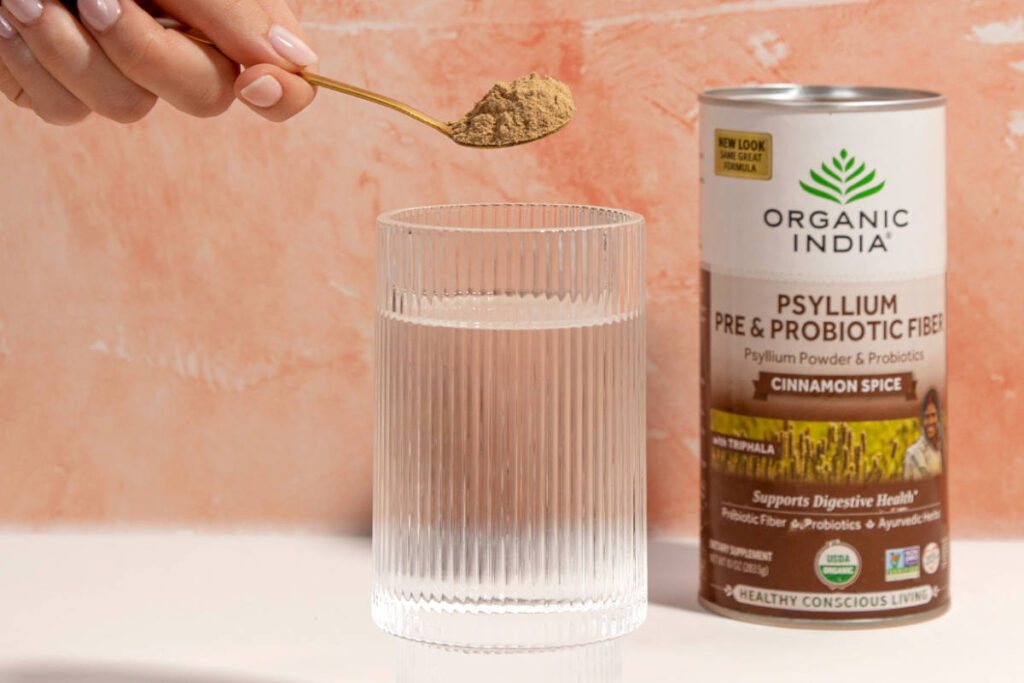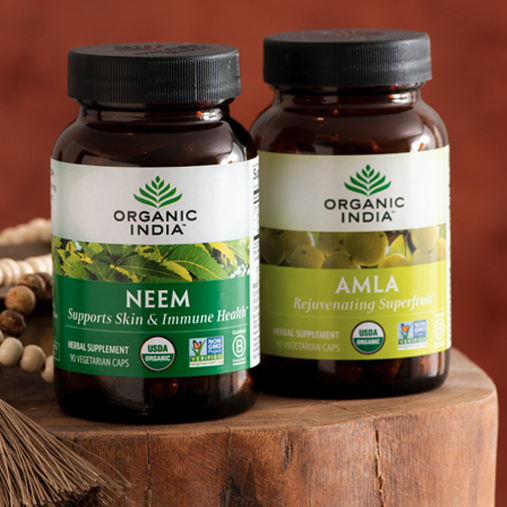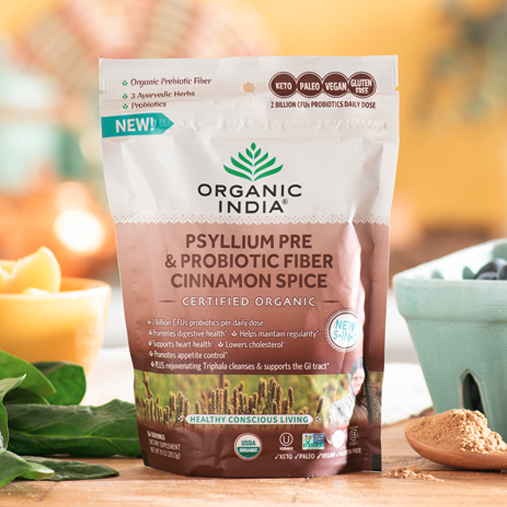Have you ever felt butterflies in your tummy before a big event or experienced stomach upset during stressful situations? These physiological responses are not just coincidences. They are real signals from your body. Where do they come from? You’ll soon find out! Welcome to the intricate realm of the stress and digestion connection, where your emotions constantly communicate with your gut.
In Ayurveda, optimal digestion is a cornerstone of whole-body wellness and mental well-being. Food is considered medicine, and healthy digestion is fundamental to supporting the mind and body.
But what happens when the delicate equilibrium of digestion is disrupted by stress? Stress and digestion are intimately connected, and a cascade of symptoms can occur when that connection is disrupted and thrown off balance, causing stomach pain, bloating, and gastrointestinal discomfort to increase.
Thankfully, relaxation techniques and natural supplements can reduce the digestive upset brought on by stress. When you understand and address the relationship between stress and digestion, you empower yourself to nurture your digestive health and well-being.
Let’s unravel how stress plays with your mental state and impacts your digestive system.
How Stress Affects the Digestive System
In the fast-paced tempo of life, stress has become an inevitable daily companion for many. You may experience stress from work burnout, stressful situations, or parenting and family life.
Stress is more than merely a mental strain; its effect extends to various aspects of your physical well-being, including the complex mechanisms of digestion. Understanding how stress impacts the digestive system is the key to making meaningful changes and overcoming the possible adverse effects.
When you experience stress, the body initiates a series of responses to better deal with the “threat” it encounters. This response is often called the “fight or flight” response, a natural survival reaction prompting the body to divert essential resources towards muscles and vital organs.
The “fight or flight” response also shifts resources and attention away from nonessential organs, like the digestive system. As blood flow is redirected away from the gut and towards muscles and vital organs, the production of digestive enzymes decreases, stalling digestion and causing bloating and discomfort.
Stress also affects the digestive system by disrupting the delicate balance of the gut microbiome. The community of microorganisms living in your gut is crucial in maintaining a healthy digestive system. These little gut bugs aid in digestion by digesting fiber and polyphenols. They also support the immune system by eliminating pathogens and maintaining the balance of beneficial bacteria. Chronic stress upsets this delicate equilibrium, allowing an overgrowth of harmful bacteria, compromising gastrointestinal function, and potentially contributing to digestive discomfort.

Can Stress Cause Stomach Pain?
Research has shown a strong connection between the brain and the digestive system. This connection can cause typical physiological symptoms to be interpreted as painful when you’re in a stressful situation. When you experience worry, apprehension, and nervousness, your body releases hormones and neurotransmitters that can negatively affect gut motility or the movement of food through the digestive tract. This slow-down in digestion can cause pain and bloating.
Have you experienced this phenomenon in your life? The worry over taking an entrance exam, the nervousness at the starting line of a marathon, or the butterflies felt as you prepare to present to a crowd are all stressors that can cause stomach pain or discomfort.
Can Stress Cause Bloating?
Stress bloating has become frequent for many in today’s fast-paced world. Like two sides of the same coin — bloating and stress often go hand in hand. Stress bloating is characterized by an uncomfortable sensation of fullness, typically due to the accumulation of air or gas in your stomach. But what triggers this response?
Stress activates the body’s natural “fight or flight” response, causing the digestive process to slow down. As a result, food may linger in the stomach longer than usual, leading to the formation of gas and its counterpart, bloating. Additionally, stress influences the gut-brain axis, disrupting the balance of beneficial bacteria in your gut microbiome. An overgrowth of harmful bacteria can further exacerbate bloating and discomfort.

What Relaxes Your Gut?
As you navigate the challenges of daily life, it is essential to recognize the sophisticated interplay between stress and digestion. Fortunately, ancient wisdom and modern practices offer insights and solutions to restore harmony. Through mindful living, stress-reducing activities, and harnessing the power of natural and organic ingredients, you can soothe stress and digestion woes, cultivating a more balanced life.
Calming Teas for Stress and Digestion
The tranquil ritual of preparing and sipping tea encourages relaxation. The simple act of taking a moment to stop, be present, and indulge the senses is a calming practice that enables the mind to slow down and release stress and tension. With numerous blends to choose from, it can be difficult to know which teas are best for calming stress and supporting healthy digestion.
Most organic herbal teas are thoughtfully crafted and blended with wellness in mind. Many infusions are enhanced by adaptogenic ingredients such as chamomile, tulsi, and ashwagandha. Adaptogens work synergistically to calm stress and create a harmonious balance between the mind and body.
The calming properties of certain herbal teas serve as a nurturing tonic for stress and digestion. Blends like Tulsi Lemon Ginger and Tulsi Turmeric Ginger offer a one-two punch—tulsi for relaxation and ginger for digestive comfort.
You’ll also find ultra-relaxing and stress-reducing qualities in the exquisitely flavorful and aromatic blends of Tulsi Honey Chamomile, Tulsi Sleep, and Tulsi Ashwagandha. Incorporate these holistic infusions into your daily tea ritual and relax as the day’s troubles dissolve as effortlessly as clouds on a summer breeze.

Meditation for Stress and Digestion
Meditation offers a holistic approach to wellness and a transformative tool that extends its benefits beyond mental calmness to improved digestive health. Meditation allows you to cultivate an intrinsic awareness of the present moment while fostering a deep connection between the mind and body.
Mindfulness and meditation activate your body’s relaxation response, easing tension and melting away stress. As you focus and relax into the breath, your body becomes better equipped to regulate its stress response.
Meditation is an invaluable tool and one of many holistic approaches to alleviating and managing the adverse effects of stress on digestive health. Regular practice can aid in stress-related digestive issues while promoting mental well-being.
Yoga for Digestion and Stress
In recent years, the ancient practice of yoga has emerged as a beneficial remedy for digestion and stress. Intertwining movement and breath, yoga fosters relaxation and digestive ease. The synergy of yoga asanas and flows creates a therapeutic habit designed to enhance the mind-body connection.
For optimal digestion, try specific yoga poses such as twists and gentle forward bends to gently massage the intestines. Poses like the Seated Twist (Ardha Matsyendrasana), Cat-Cow (Marjaryasana-Bitilasana), and Supine Spinal Twist (Supta Matsyendrasana) may alleviate bloating and support general digestion. The intentional focus on the breath during these postures creates a pathway to reduce stress and generates a sense of overall happiness.
Herbal Supplements for Stress and Digestion
For those seeking additional curative support, herbal supplements can be instrumental in easing stress and supporting digestive health. The soothing benefits of adaptogenic herbal tea blends, such as ashwagandha and tulsi, promote a peaceful and tranquil respite.
Ginger and chamomile, renowned for their role as digestive aids, stand alongside a host of herbs that effectively ease and soothe digestive discomfort.
- Triphala promotes healthy elimination with a gentle laxative action.
- Trikatu, featured in Turmeric Formula, is a tri-herb blend traditionally used in Ayurveda to stimulate “agni” or “digestive fire.”
- Herbal Laxative is a senna-free alternative that gently stimulates digestion without causing gastrointestinal discomfort.
- Organic Psyllium helps detoxify, cleanse, and increase fiber intake. Psyllium is a wonderful aid for digestive support and provides gentle laxative action.
These herbal supplements for stress and digestion offer a diverse and holistic approach to enhancing digestive health and vitality.

Understanding the Link Between Stress and Digestion
Connecting the dots between stress and digestion helps you understand the interplay between your mental health and digestive unrest. They are intimately coupled, making holistic living vital, especially if you experience stomach pain or bloating caused by stress.
Fortunately, ancient wisdom still flourishes today, inviting you to embrace the transformative practice of meditation, the therapeutic movements of yoga, and the calming and nourishing benefits of herbal supplements. Incorporating these modalities into your daily and weekly routine will enable you to tame the beast of stress and ground yourself in soothing rituals.
At ORGANIC INDIA USA, our mission is to serve as your guide, leading you on a journey toward a harmonious and balanced life through holistic practices. We invite you to discover the many nuances of Ayurvedic traditions through the myriad of articles on our blog. We hope you’ll enjoy the gift of healthy, conscious living for years to come.














